Recap of the Photonics Days Jena 2019
Impressions of past Photonics Days Jena
+ Photonics Days Jena 2019
Geared towards young scientists, the traditional annual event of the Fraunhofer Institute for Applied Optics and Precision Engineering IOF – the Photonics Days Jena – took place from September 17 to 19, 2019. Together with the photonics graduate school Max Planck School of Photonics, the participants were offered a varied program.
They tinkered, pitched and networked for all it’s worth: This year’s Photonics Days Jena was quite an affair. The annual event of the Fraunhofer IOF was organized in cooperation with the newly established Max Planck School of Photonics as an HR and career event for the first time and primarily addressed students and doctoral students.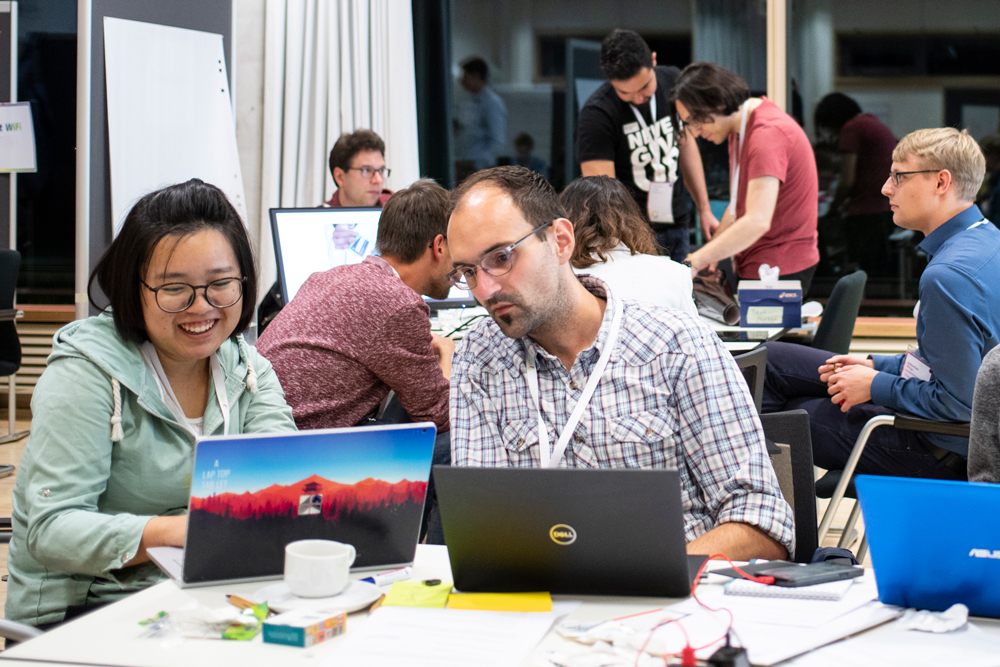
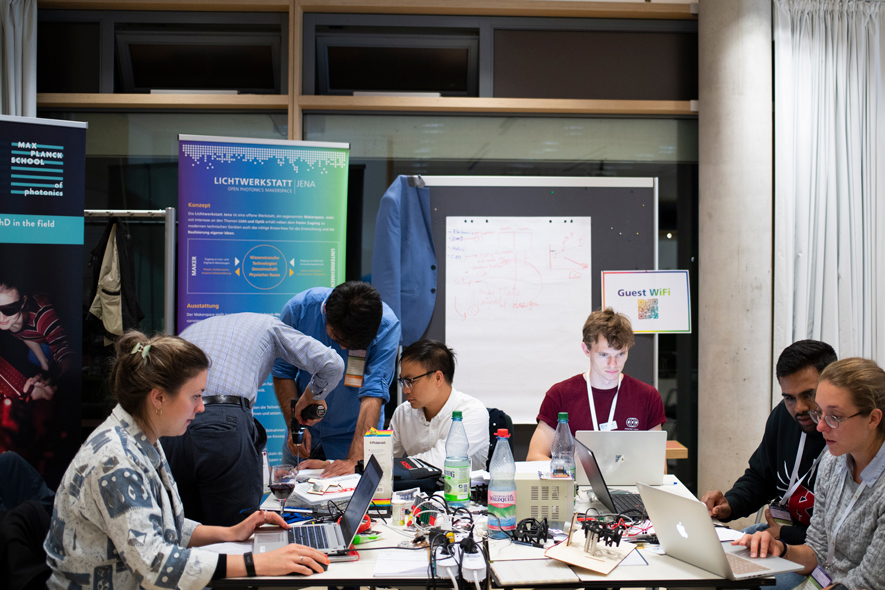
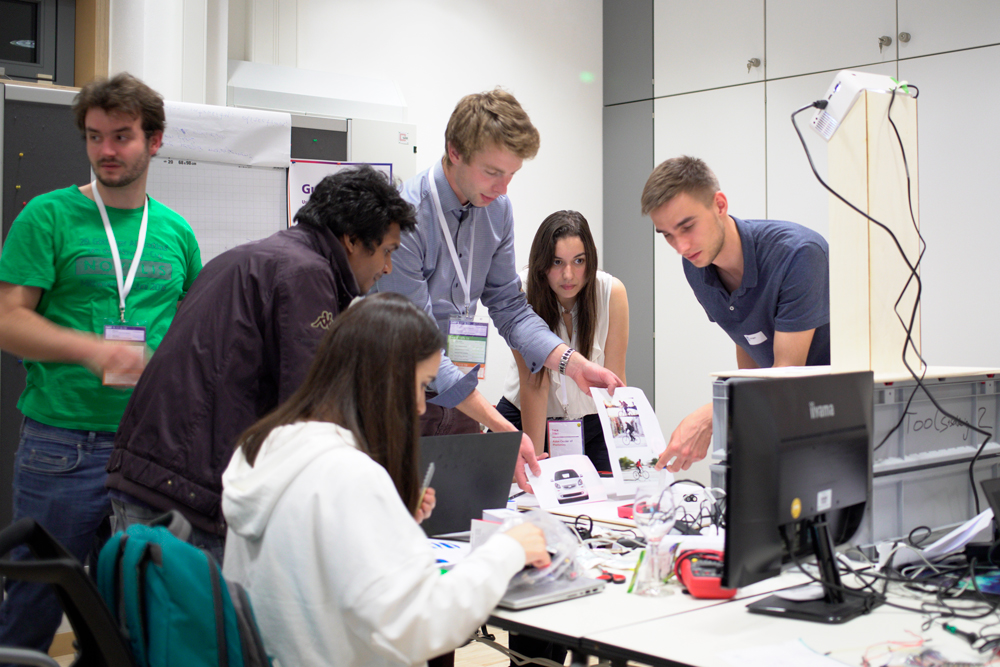
The Makeathon of the Lichtwerkstatt Jena – the Photonics Makerspace of the Friedrich Schiller University Jena – focused on finding creative solutions to questions from the field of photonics. The elaborated projects were presented in the form of short pitches to a jury, who awarded the best idea among a large number of innovative ones.
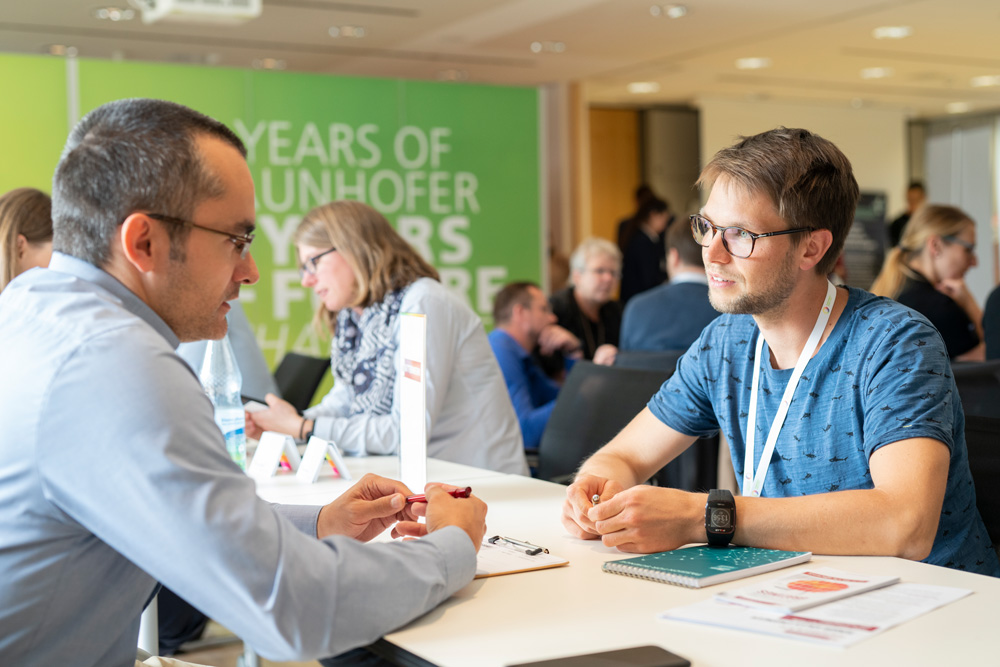
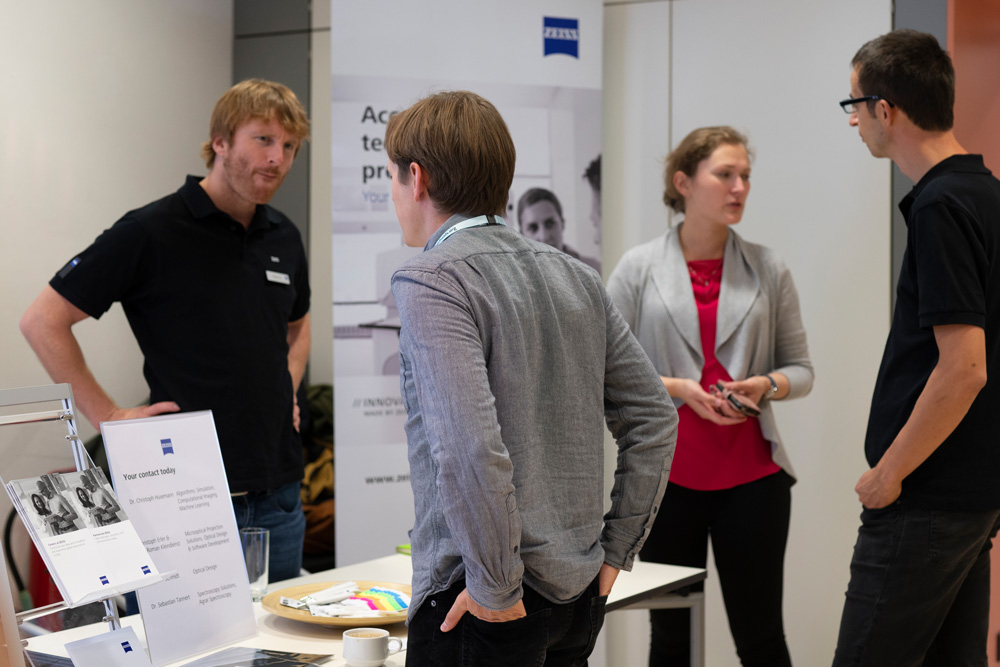
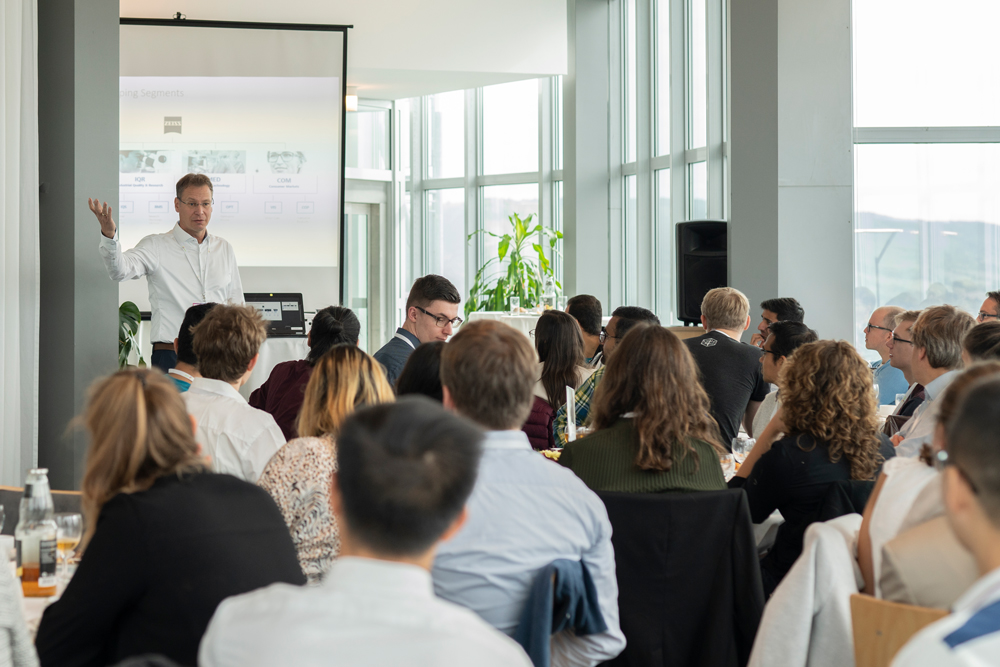
Moreover, the participants were offered extensive opportunities to clarify questions about their career choices: Which career paths can you chose in photonics? What is important when applying for jobs at photonics companies? In order to gain perspectives, participants had ample opportunity to meet representatives of the optics and photonics industry (at a science and industry breakfast and industry speed dates), while they could also gain insights into future trends and requirements in the industry.
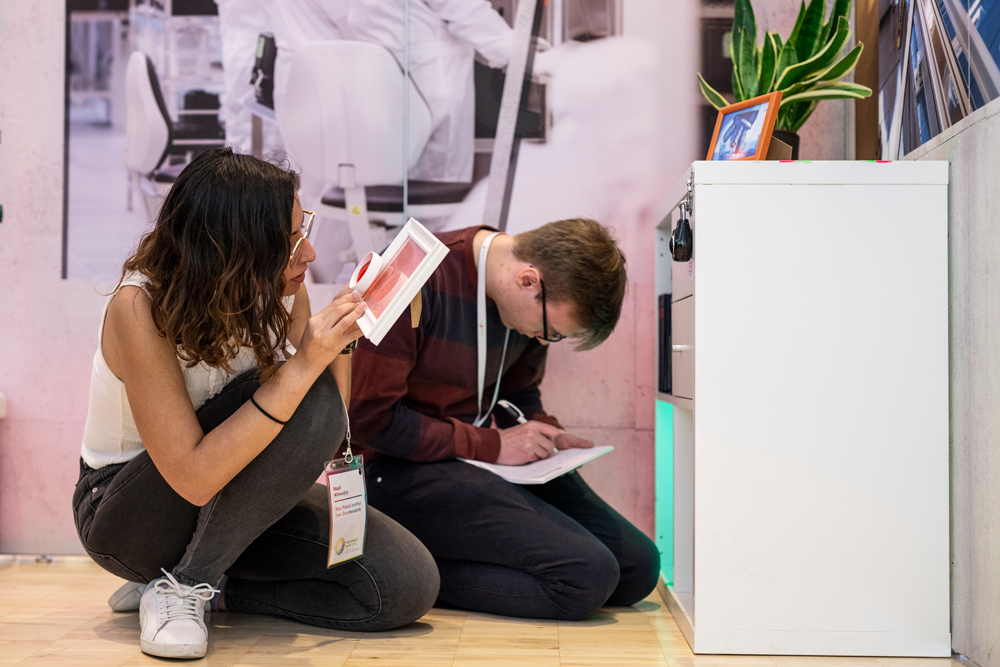
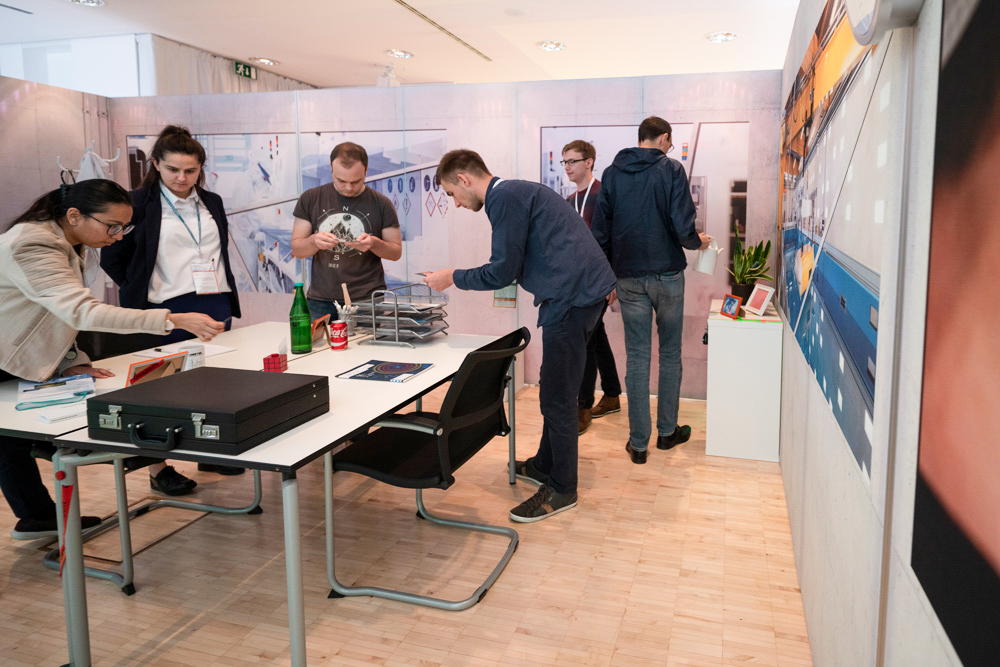
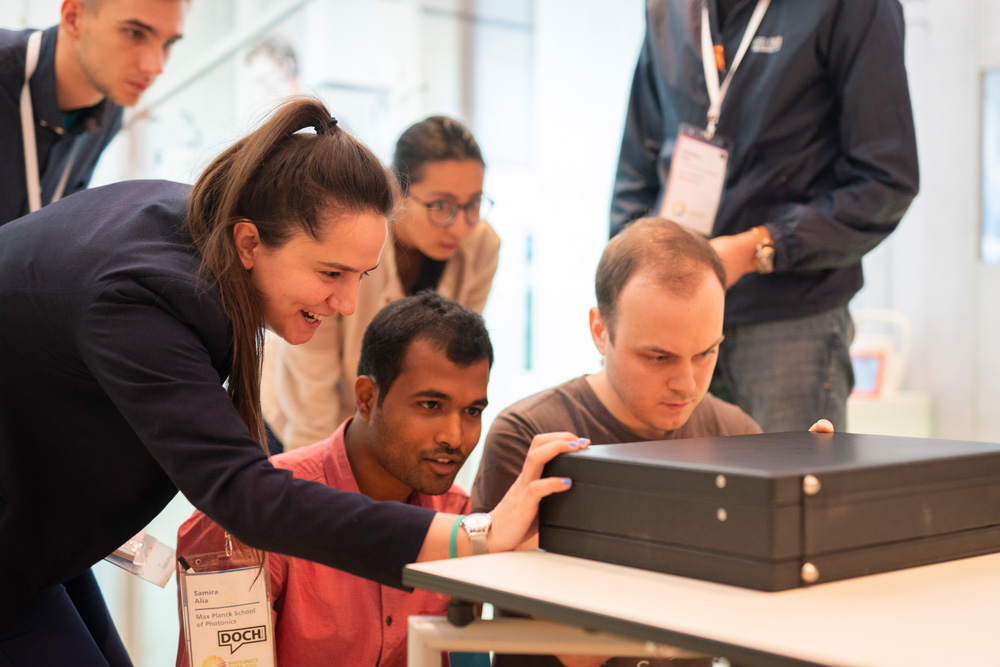
In addition to the makeathon, students could also demonstrate their scientific creativity in an escape room. Bundling their competencies, they had to solve different riddles to find their way out of the escape room.
Free lecture program: Elevator Pitches and Physics Nobel Prize winner
On the occasion of the 70th anniversary of the Fraunhofer-Gesellschaft, a public lecture series was added to the program. Around 300 visitors filed into the lecture hall of the Friedrich Schiller University to listen to the keynote speeches by ZEISS CEO Prof. Michael Kaschke and physics Nobel Prize winner Gérard Mourou. The “Elevator Pitches” of the Center of Excellence in Photonics, in which young scientists had to convince the audience of their research ideas in quick 3-minute lectures, also enjoyed great popularity.
René Lachmann and Benedict Diederich from the Leibniz Institute for Photonic Technologies (IPHT) received the most votes. They presented an approach for developing sophisticated microscope technology, which is otherwise only available in stationary form, as a mobile toolbox. In order for the concept to be imitable – e.g. for educational institutions or laboratory environments – the data of the project is publicly accessible. With their pitch, they prevailed over a total of seven competitors and received 20,000 euros in prize money from the funds of the Center of Excellence in Photonics.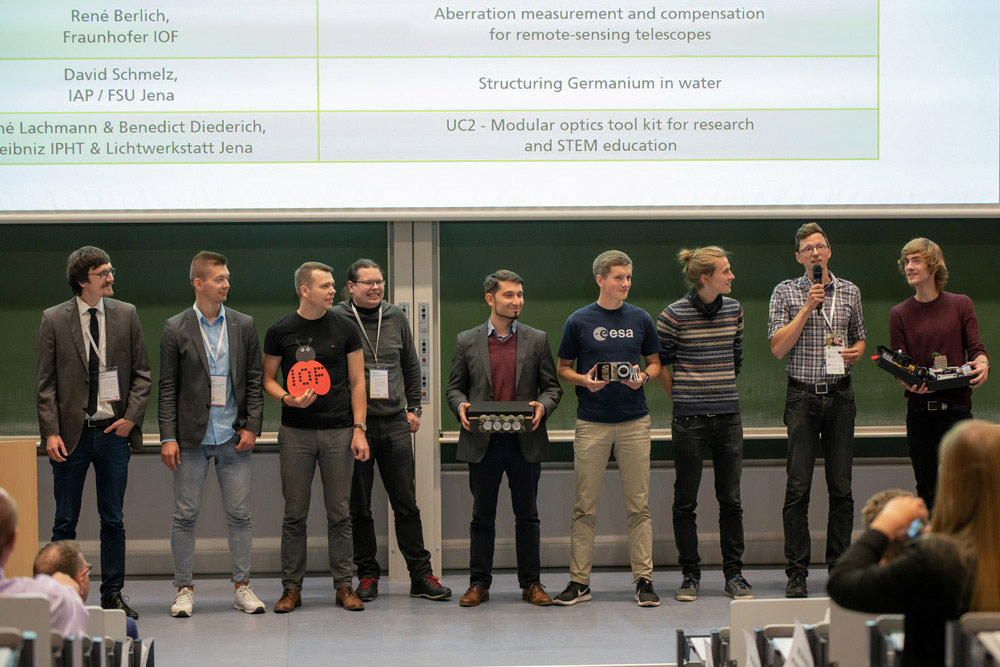
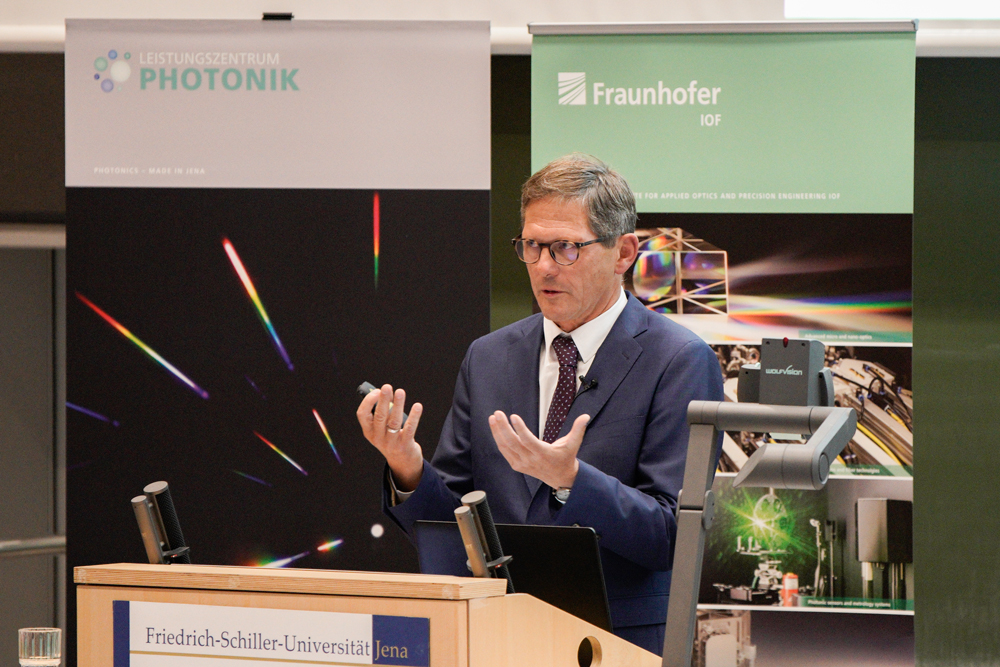
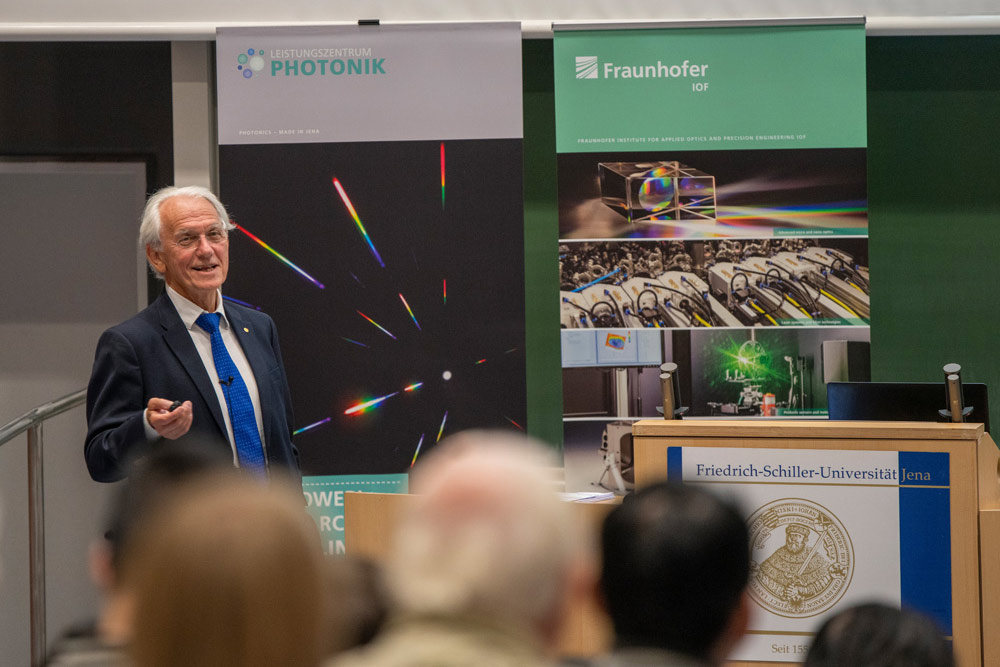
+ Photonics Days Jena 2020
Creativity meets career – this is probably the best way to describe the Photonics Days Jena 2020, which were held under the motto #Create and #Connect. Once again, Fraunhofer IOF, together with the graduate school Max Planck School of Photonics, organized the career and networking event for students of optics and photonics – and this year it was completely digital. On September 21 and 22, participants from all over the world tinkered around during the virtual makeathon of the Lichtwerkstatt Jena, evaluated the innovative ideas of the pitching scientists at the “Hot Stuff Award” and networked with representatives of the German optics and photonics industry at the interactive career fair.
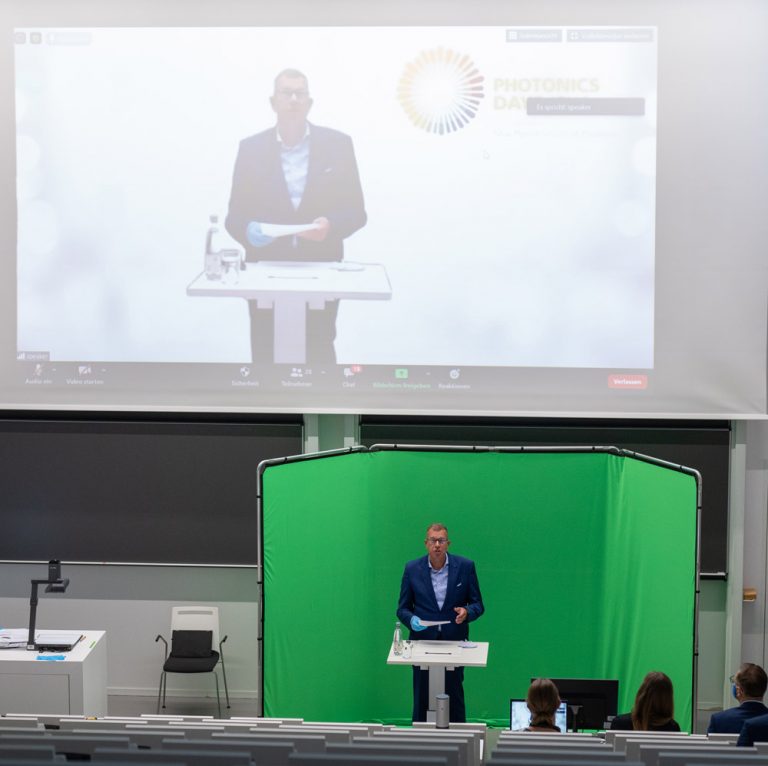 Prof. Andreas Tünnermann spricht per Live-Videoübertragung zu den Teilnehmenden der virtuellen Photonics Days 2020.
Prof. Andreas Tünnermann spricht per Live-Videoübertragung zu den Teilnehmenden der virtuellen Photonics Days 2020.Due to the corona pandemic, the entire event was held completely virtually this year, which proved to be a great advantage – at least for the diversity of the participants. Students from all over the world – for example from India, Mexico, Iran and Finland – met and networked during the two days of the event.
In Prof. Tünnermann’s keynote speech on the relevance of this discipline in the modern world, it became clear how much the research field “Photonics” can contribute to these solutions. Special attention was paid to quantum photonics and its influence in the coming years.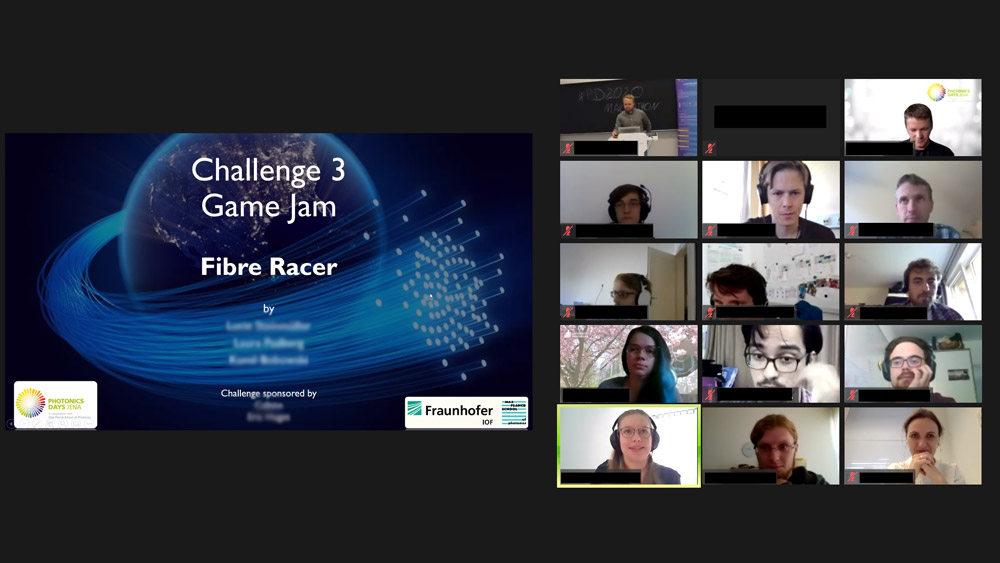 Screenshot during a team pitch for the Makeathon.
Screenshot during a team pitch for the Makeathon.Afterwards, the participants started motivated into the makeathon of the Lichtwerkstatt Jena, where they developed and implemented creative solutions for photonic problems. The results of the two teams exceeded the expectations of the audience and the jury by far and proved that effective collaboration on real problems is also possible in virtual space. The team “Game Jam” won by a narrow margin with the original idea of making optical signal transmission tangible through a video game.
Impetus for research and active networking at the “Hot-Stuff-Award” and the career fair
The second day also provided a stage for young photonics talents to demonstrate their skills and enthusiasm for science and innovation. During the elevator pitches for the “Hot-Stuff-Award” of the High-Performance Center Photonics, young scientists presented their project ideas to a virtual audience in five minutes in short videos. Johannes Kretzschmar from the Makerspace of Lichtwerkstatt Jena won this scientific competition. In his project he wants to build a knowledge base for the automation and remote control of laboratory work. This includes the mapping of experiments on digital twins, the control via IoT infrastructure and the visualization by means of technologies for computer-aided augmented or virtual reality perception (AR and VR technologies). We are eager to see how the winning team will use the 15,000 € prize money to further develop their interesting idea.
At the career fair that followed, students and guests had the opportunity to talk to representatives of twelve companies and research institutions and received valuable career tips.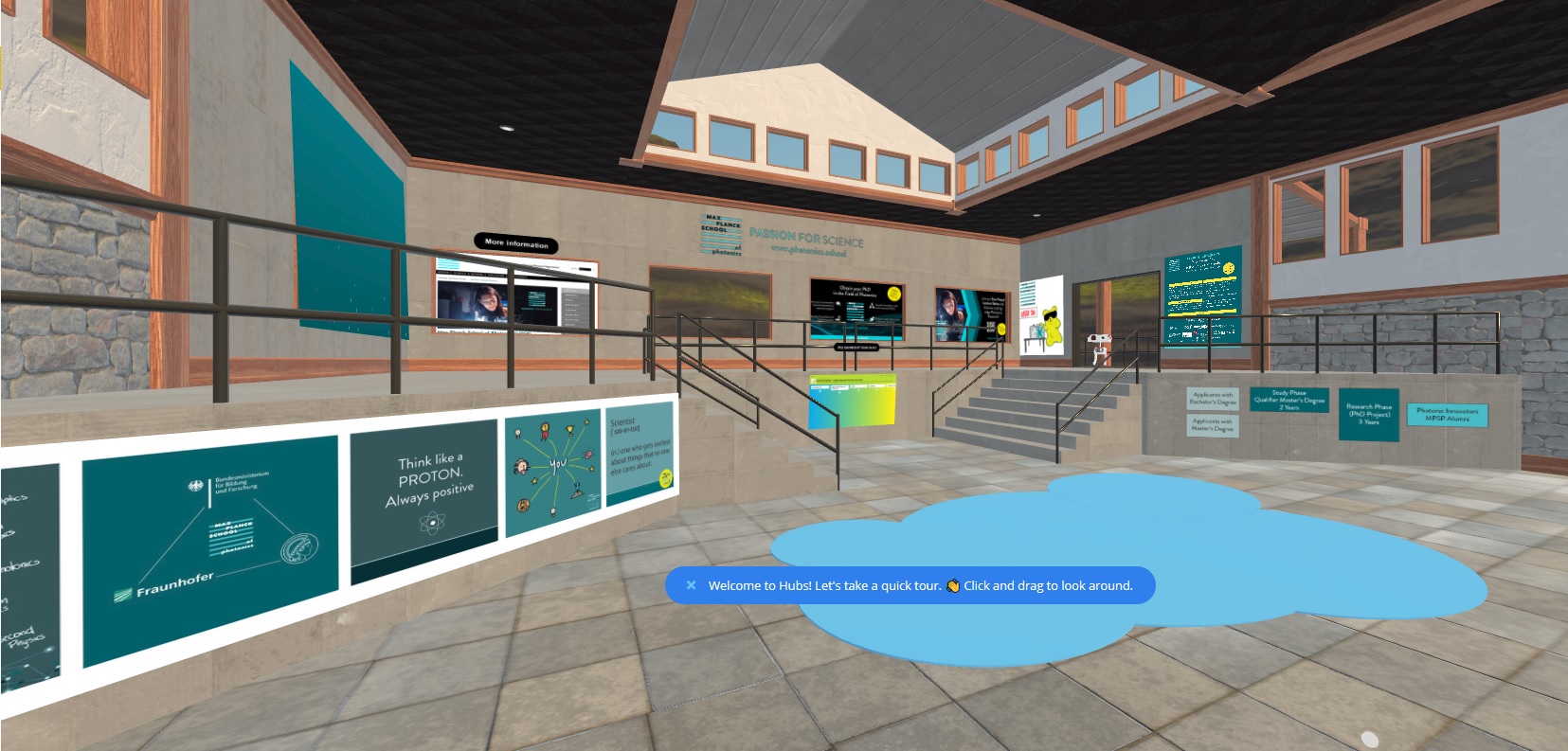 Virtual hall with posters from the Max Planck School of Photonics.
Virtual hall with posters from the Max Planck School of Photonics.In addition, participants of the Photonics Days Jena 2020 were able to look around and interact with other participants in the form of avatars in various virtual halls where individual companies presented themselves and posted job advertisements.
+ Photonics Days Jena 2021
One Nobel Prize winner, two funding awards, 45 program points, almost 50 speakers and nearly 600 participants from all over the world: These were this year’s “Photonics Days Jena”. The career and networking event for students and doctoral candidates in the field of optics and photonics, organized by the Fraunhofer Institute for Applied Optics and Precision Engineering IOF and the Max Planck School of Photonics, met a high international interest in its third year with a hybrid format.
“In German we say: ‘Von nix, kommt nix.’ (engl.: Nothing comes from nothing),” says Reinhard Genzel with a grin. He should know: In 2020, the astrophysicist was awarded the Nobel Prize in Physics together with his U.S. colleague Andrea Ghez. Together, they were able to detect a black hole at the center of our galaxy over decades of research. So Genzel knows what it means to say that in science, sometimes you have to prove quite some staying power. But that with a spark of passion and a pinch of perseverance, all that work pays off in the end. For this Genzel is the best proof. “Invest yourself, work hard!” the scientist therefore calls out to the participants of this year’s “Photonics Days Jena” during his virtual keynote.
For the third time, Fraunhofer IOF and the Max Planck School of Photonics invited students and doctoral candidates in the field of optics and photonics to their career and networking event. This year, the hybrid format also invited an international community to a virtual visit to the light city of Jena from September 29 to 30: Participants were connected not only from Germany but mainly from India and the USA.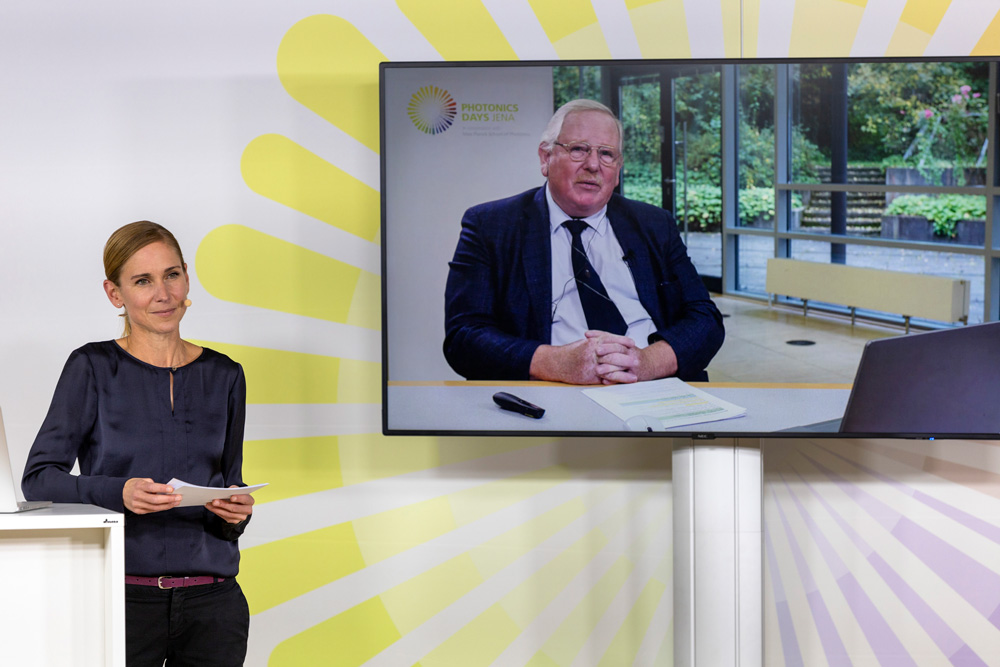 Could not be there live, but contributed virtually to the “Photonics Days Jena” with a keynote: Prof. Dr. Reinhard Genzel together with moderator Ulrike Brandt-Bohne.
Could not be there live, but contributed virtually to the “Photonics Days Jena” with a keynote: Prof. Dr. Reinhard Genzel together with moderator Ulrike Brandt-Bohne.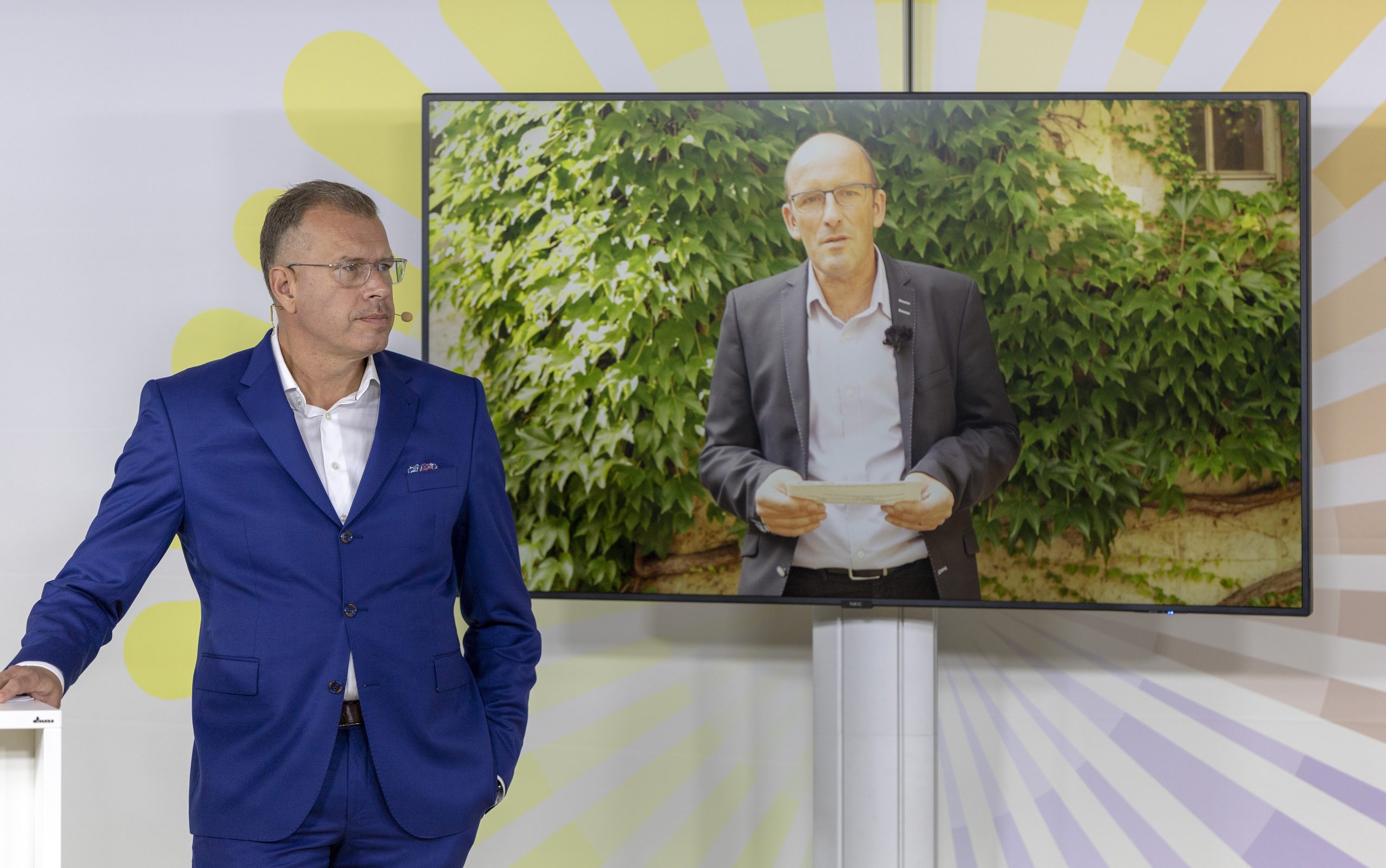
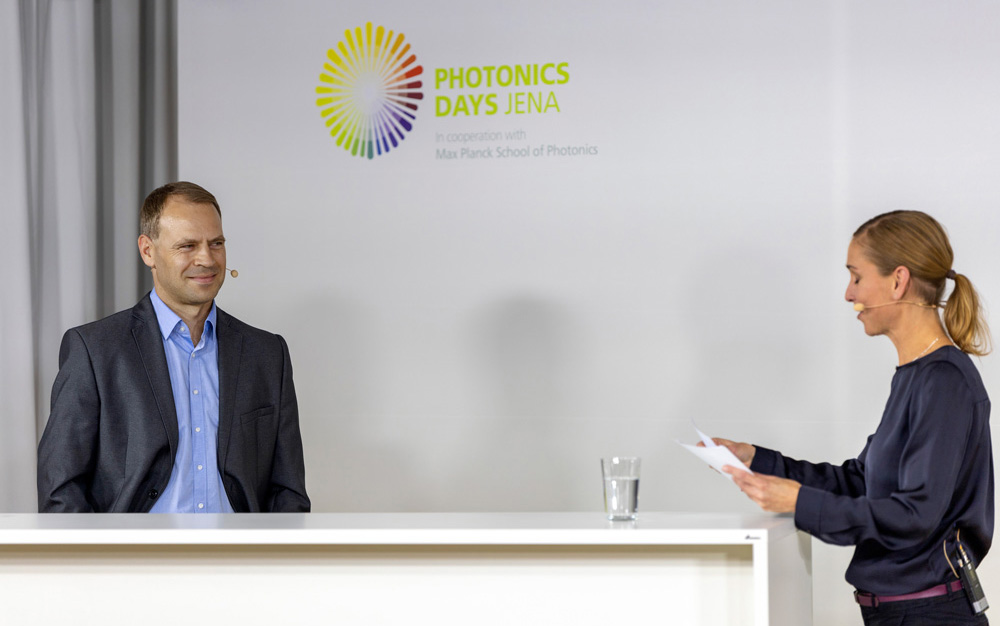
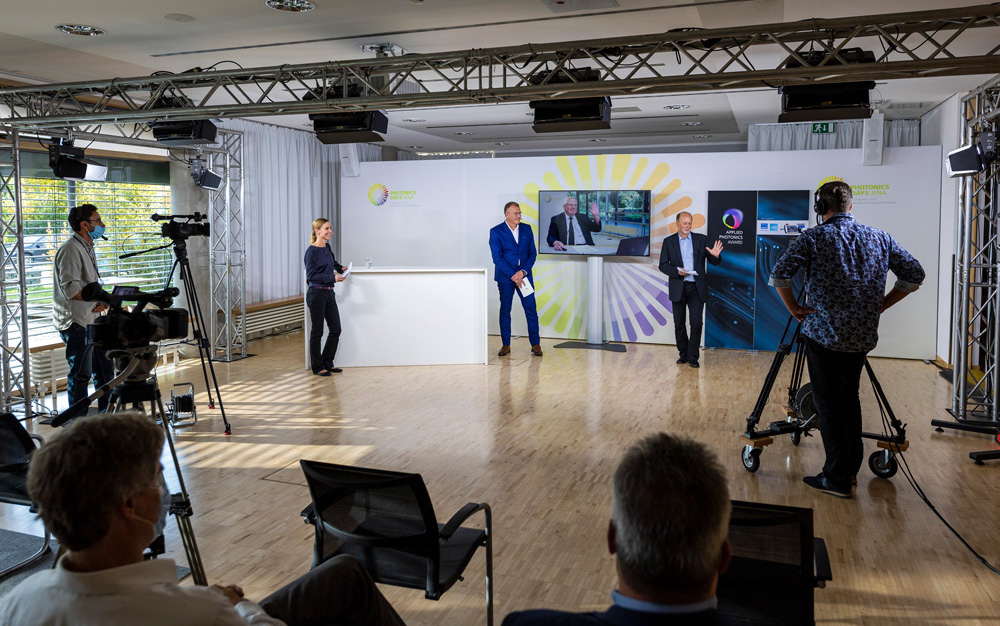
The aim of the “Photonics Days Jena” is to network young talents in order to promote innovations and career paths in the fields of optics and photonics. There are plenty of topics and fields of work with bright future prospects in which young photonics fans can “invest” their talent, as Genzel puts it – and there are more and more. Quantum technologies are currently a particularly fast-growing market, Heike Riel knows. At international IT giant IBM, Riel heads the “Science & Technology” department as well as IBM’s research group on “Quantum Europe & Africa” and is thus a proven expert on current developments in the market: “Quantum technologies are a hot topic,” she says during the event. “But there is still a lot of research to be done!” Research for which creative minds and fresh ideas are needed.
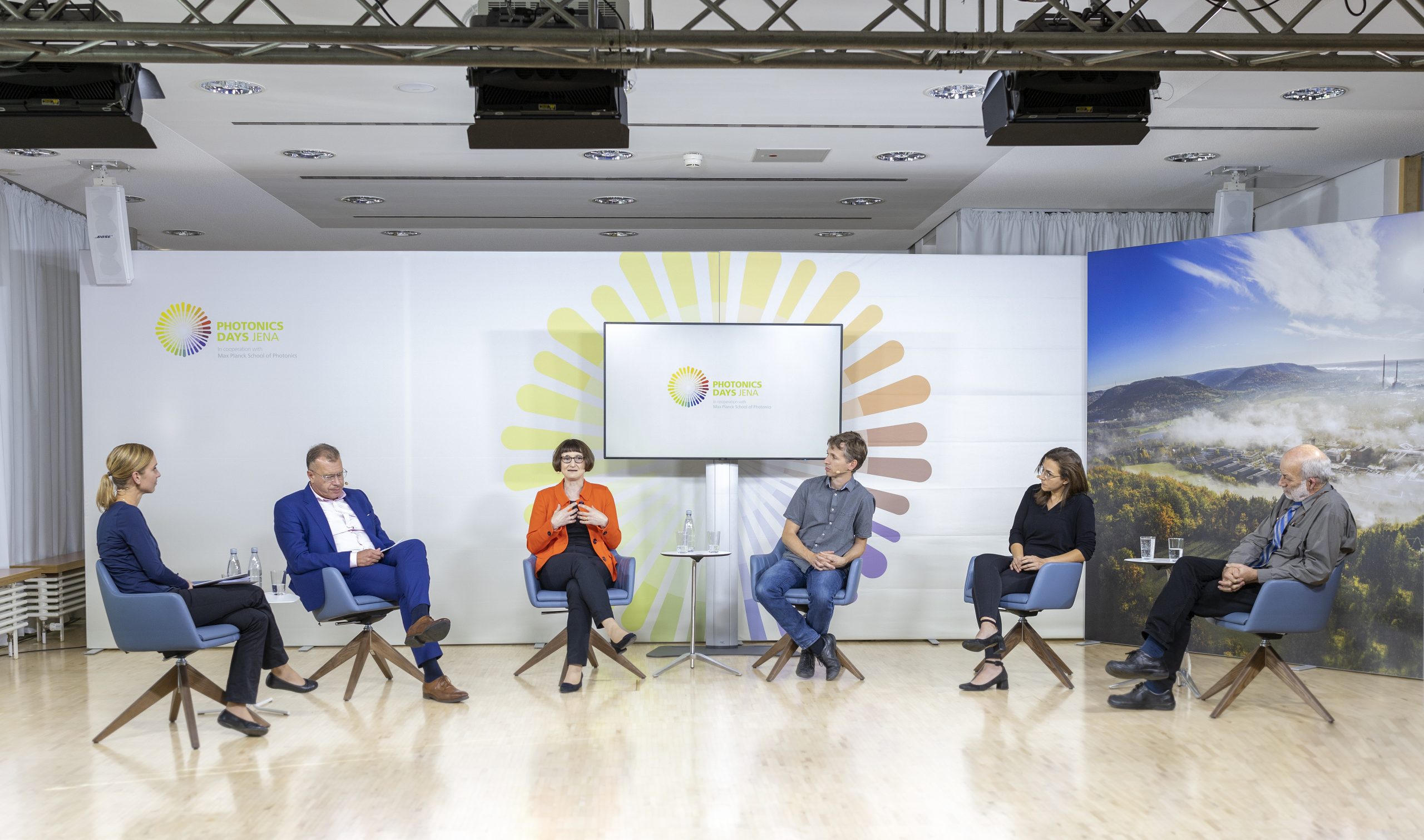
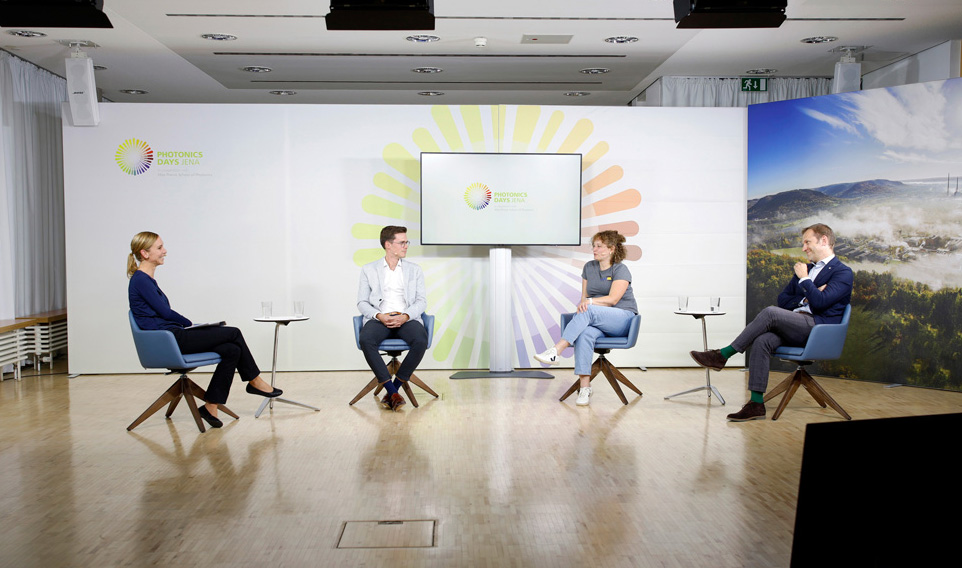
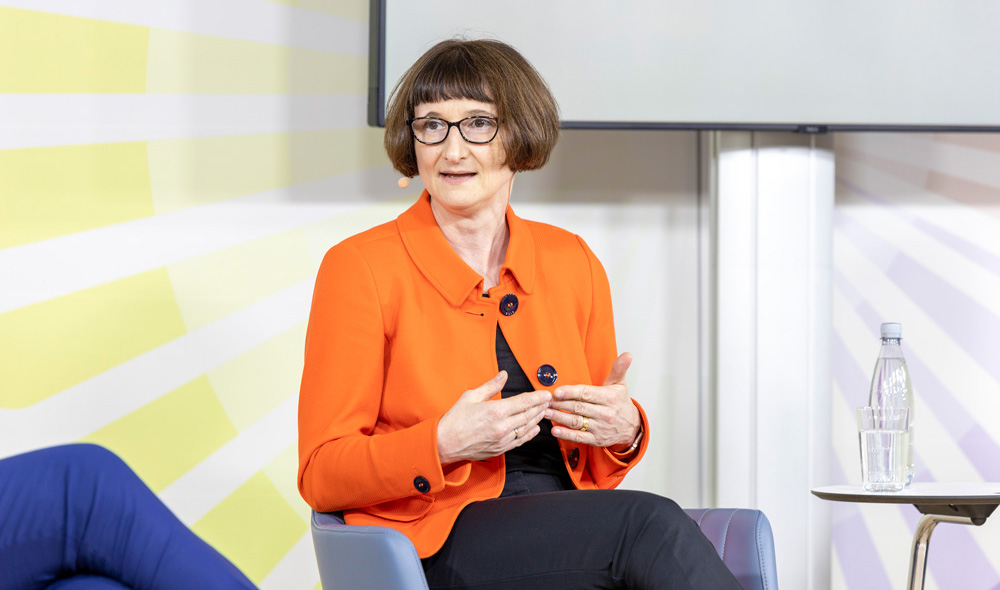
Focus on networking and creativity
In order to develop precisely such ideas, the “Photonics Days Jena” offered an interactive platform with a colorful program of workshops, lectures and a makeathon. Creativity was also the focus of the two funding awards presented during the event:
In the pitch for the “Hot Stuff Award”, presented by the Center of Excellence in Photonics in Jena, four young researchers with different project ideas applied for financial support from the center. The audience decided on the allocation of the funding via online voting: First place went to Johannes Kretzschmar from the “Lichtwerkstatt Jena”. As an open laboratory, the Lichtwerkstatt offers a platform for tinkering, working and fiddling for all fans of optics and photonics. Work with the increasingly important quantum technologies is also to be made more accessible here. Kretzschmar and his team therefore want to provide an open source single photon detector. Kretzschmar now has 10,000 euros in funding from the Center of Excellence in Photonics to support this project. But the other pitchers did not go away empty-handed: Canan Gallitschke (Open Source Smart Glasses), Anton Averin (Non-invasive Glucose Detector) and Denny Häßner (Radiation Balanced Fiber Laser) each received 5,000 euros.
In addition, the “Applied Photonics Award”, the Fraunhofer IOF’s young researcher award, was presented. It is awarded for innovative theses that are particularly related to applied photonics. This year, the award went to theses that dealt with clean water, the removal of space debris, as well as new methods for medical endoscopy and more powerful lasers. A jury of experts, consisting of representatives from science and industry, had previously selected the winning papers. More about this year’s presentation of the “Applied Photonics Award” in the press release about the award ceremony.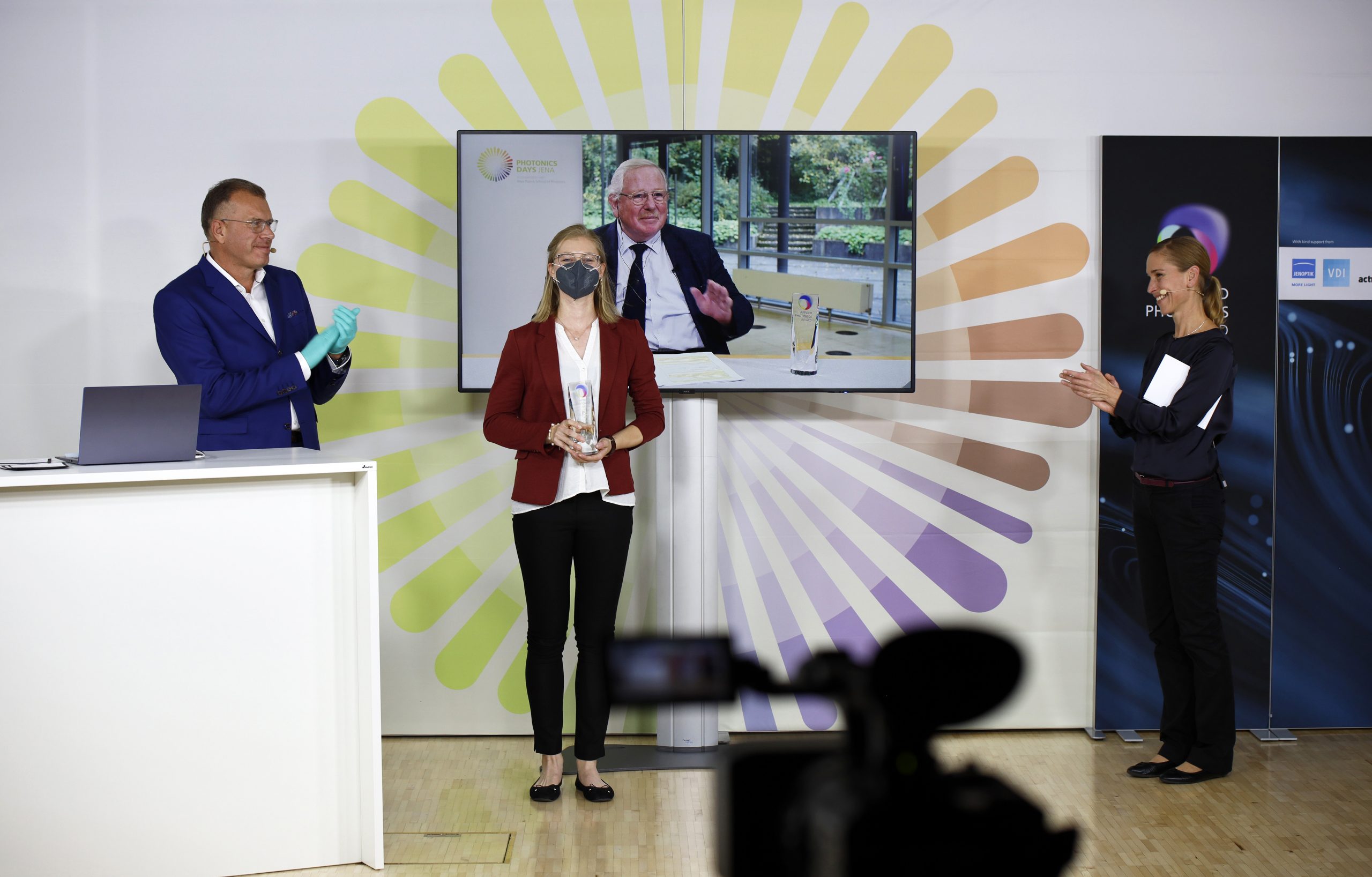
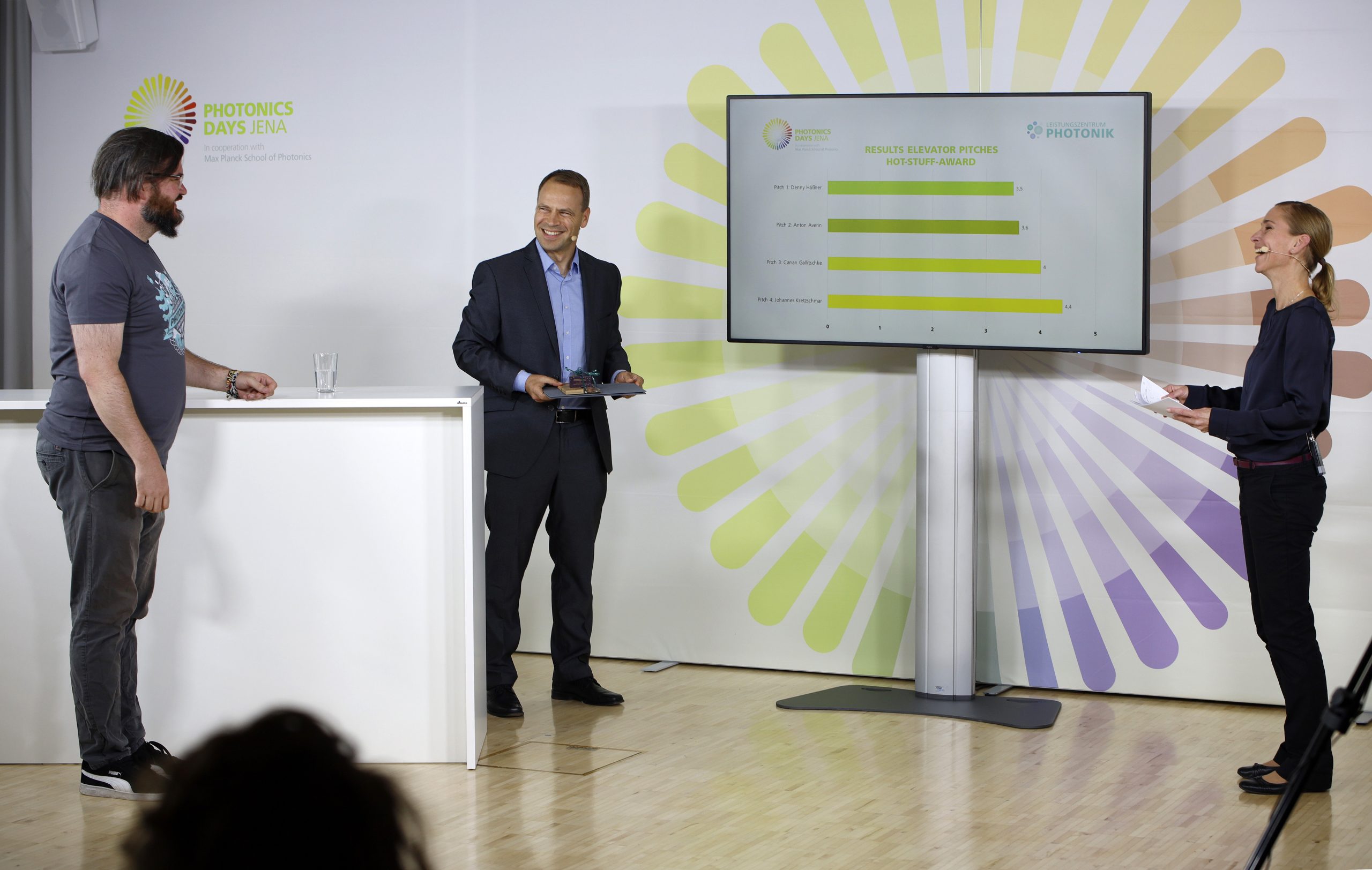
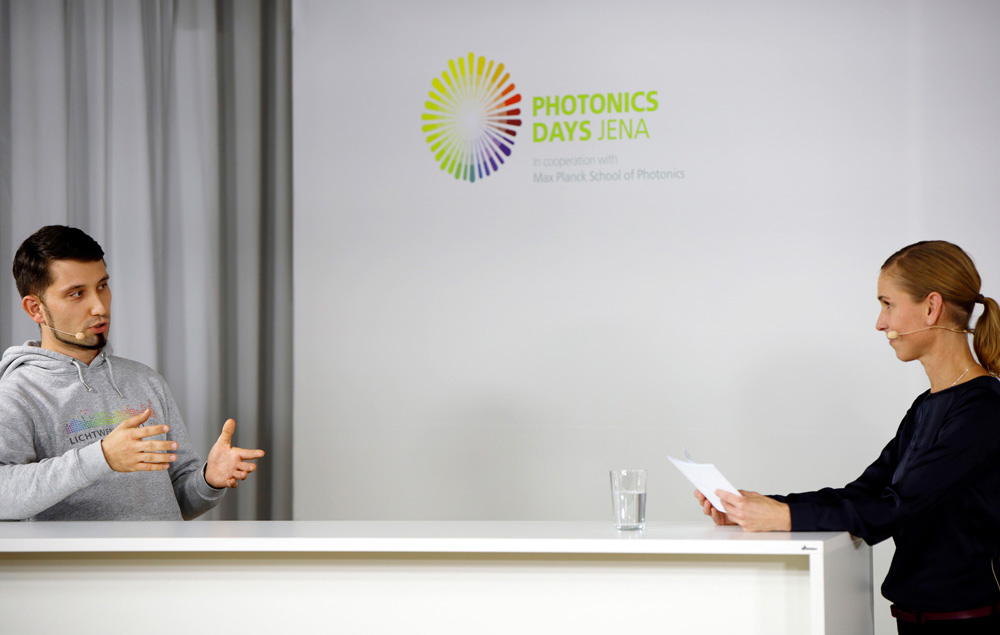
+ Photonics Days Jena 2022
With a hybrid format, the “Photonics Days Jena” again met with broad international demand this year: A total of 18 nationalities were represented at the career and networking event for students and doctoral candidates in optics and photonics, organized by the Fraunhofer Institute for Applied Optics and Precision Engineering IOF and the Max Planck School of Photonics. In addition to Germany, participants came primarily from Mexico and India.
Small things that make big waves – that’s what this year’s “Photonics Days Jena” was all about. Just the day before the event, the Royal Swedish Academy of Sciences in Stockholm announced that this year’s Nobel Prize in Physics will go to three quantum researchers. Since then, not only an established research community, but the whole world has been looking at the importance of the smallest unit known to us, the quantum, and the potentials that lie in the application of entangled quanta.
How fitting, then, that the young talent event of Fraunhofer IOF and the Max Planck School of Photonics from October 5 to 6 also placed a significant focus on current trends and developments in quantum technologies: In the lecture series “Photonics4Future”, three lectures offered participants in-depth insights into the topics of quantum communication and computing.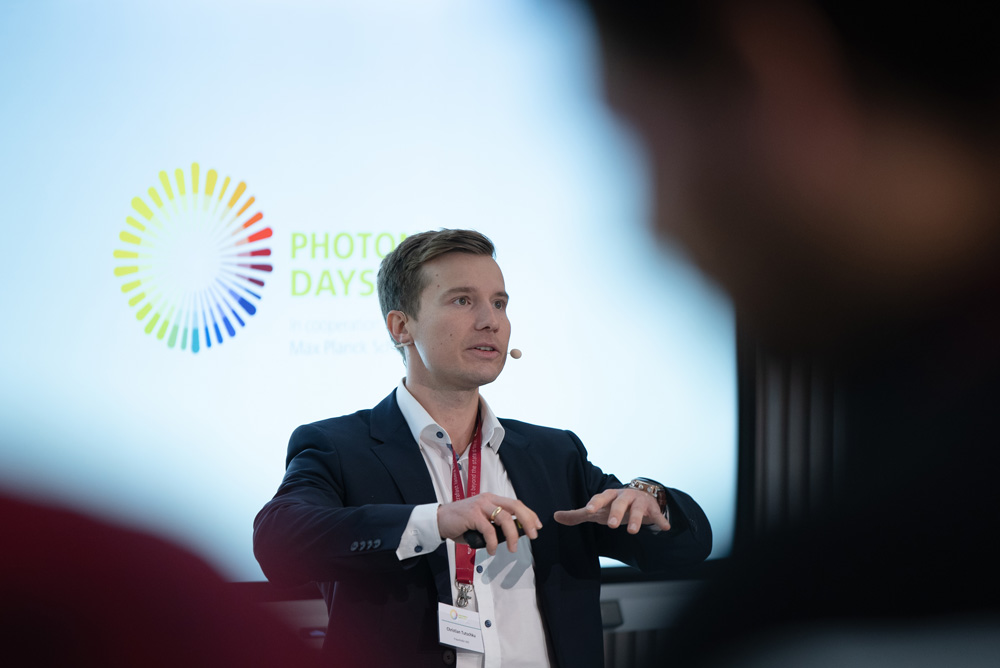 Christian Tutschku talks about quantum computing at his Photonics4Future lecture.
Christian Tutschku talks about quantum computing at his Photonics4Future lecture.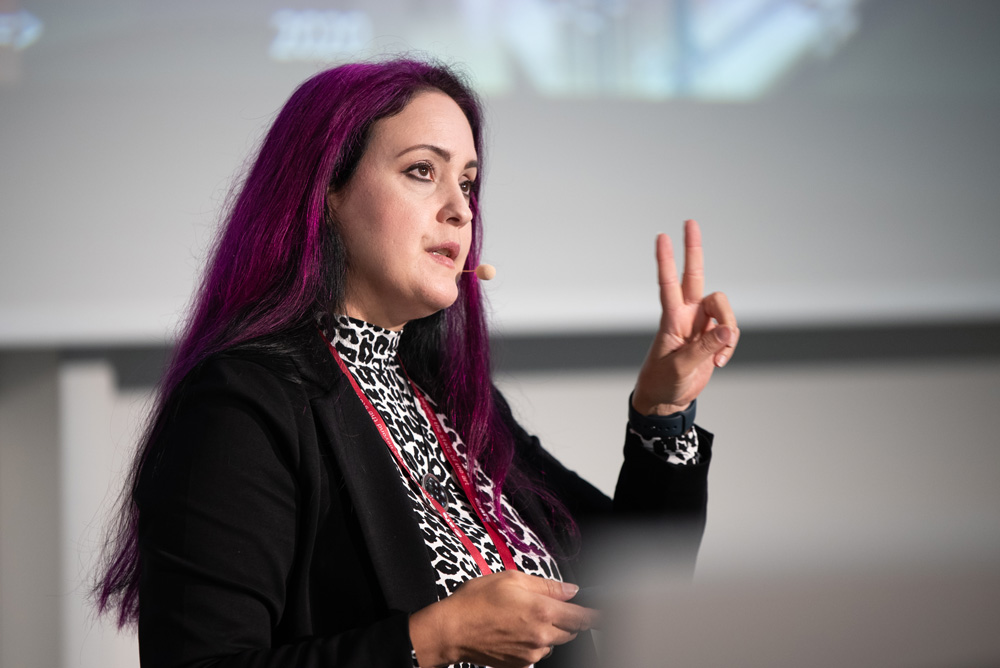
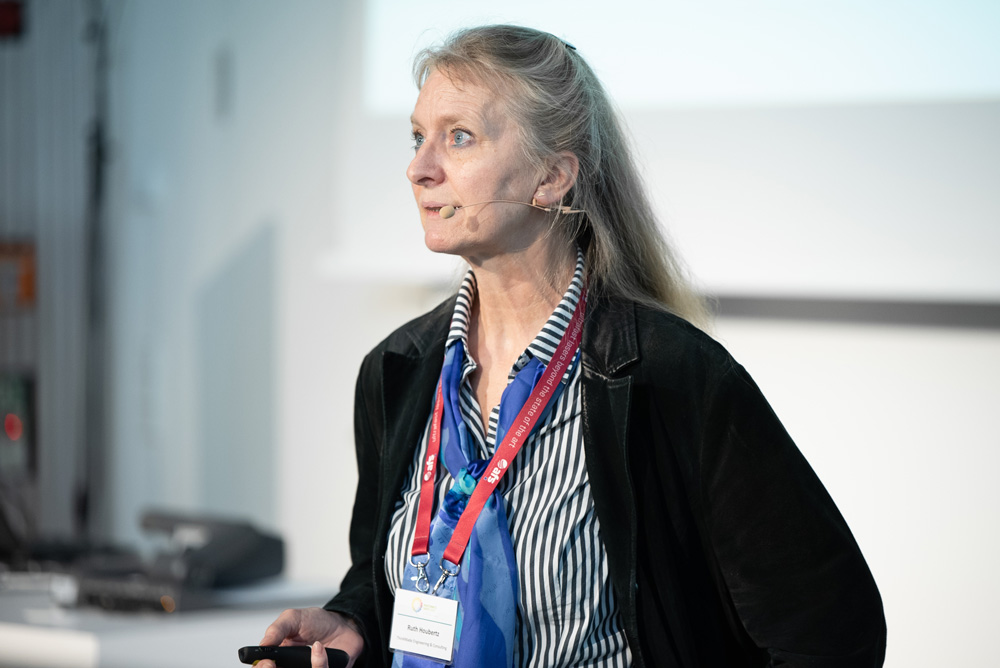
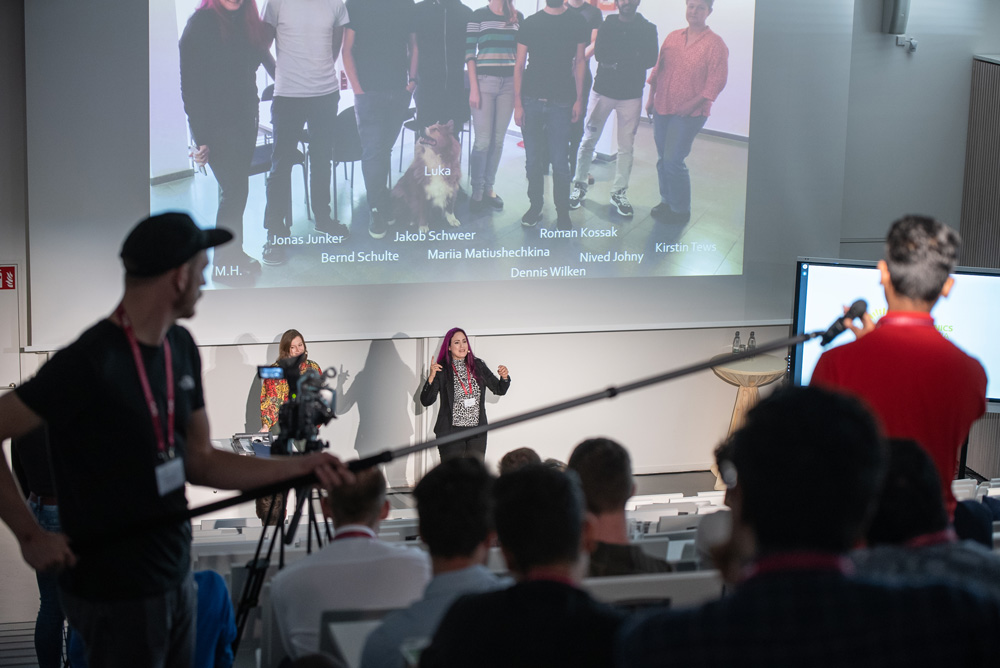
From small to large and back again
But the big world of small quanta was by no means the only thing that young talents and renowned researchers debated with each other: With her keynote address “Gravitational waves in a new light”, Prof. Dr. Michèle Heurs introduced the participants to a topic that – in the sense of the word – is making at least as big waves in research. Finally, entrepreneur Dr. Ruth Houbertz took us back to the small things with the event’s second keynote: “Miniaturization of optics – where does this journey go?”
In addition to the professional dialog, the “Photonics Days Jena” focus on one thing in particular: networking. Be it within a scientific community or with regard to one’s own professional career. With an Industry Breakfast on site in Jena as well as a virtual career fair, the event offered many opportunities to get to know attractive employers in the industry and to discuss one’s own career possibilities.
Face-to-face workshops in Jena, for example on science communication or academic writing, and virtual online sessions, for example on intercultural skills or “digital detoxing” in a new working world, also offered the opportunity to hone one’s own social skills and scientific competencies.
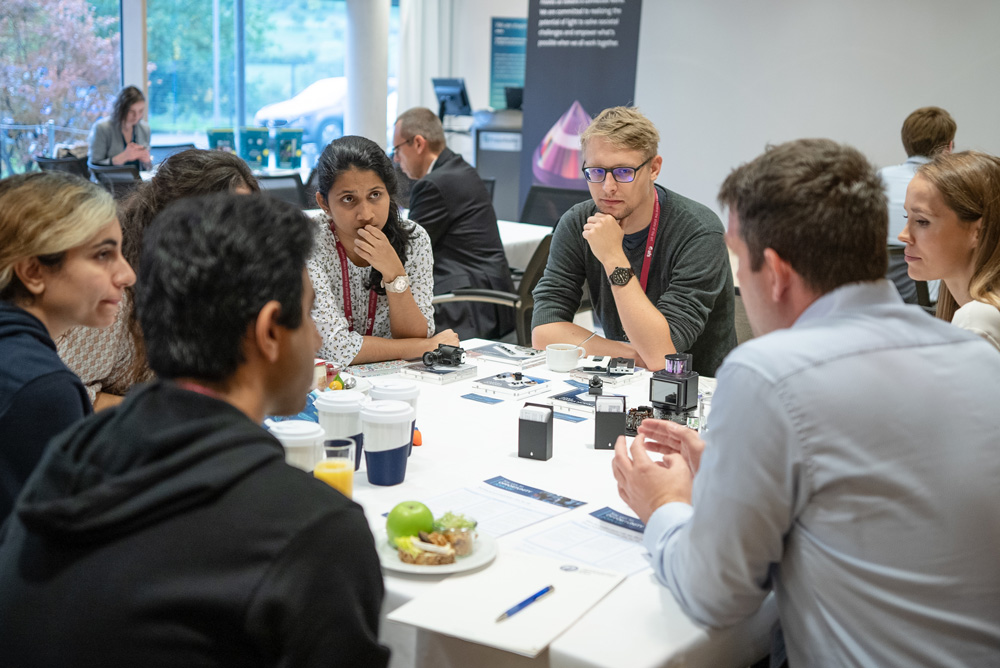
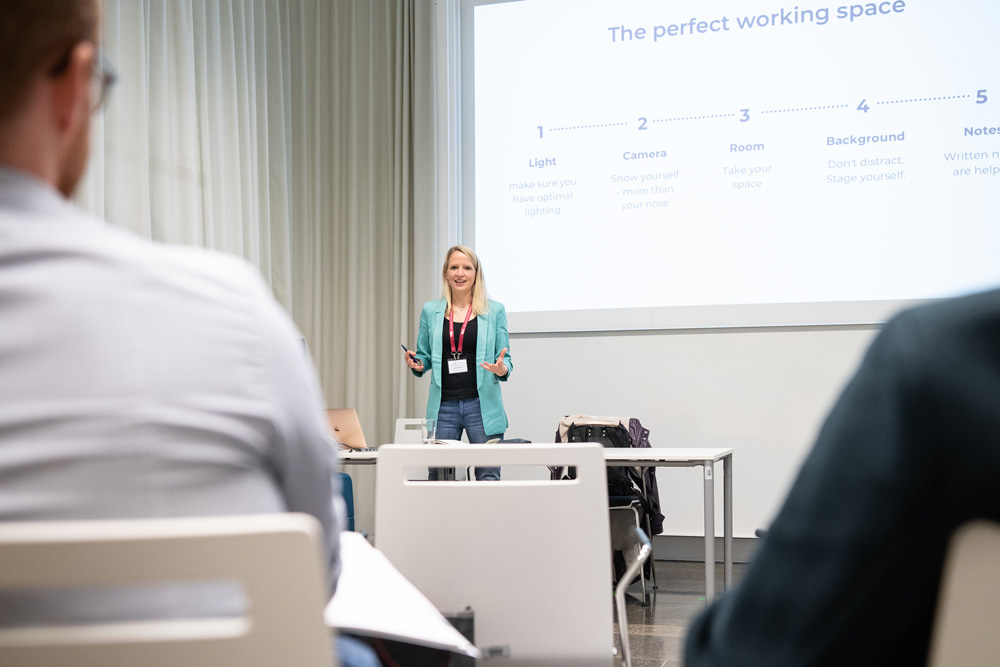
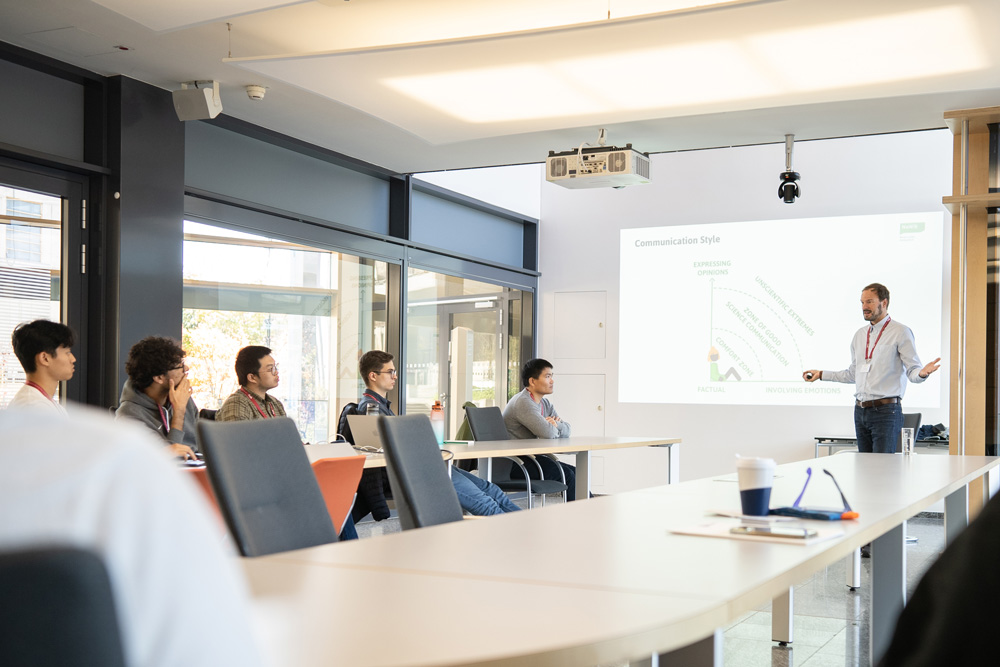
+ Photonics Days Jena 2023
"A lot is being done for space research in Jena," said Prof. Anke Kaysser-Pyzalla, CEO of the German Aerospace Center, at this year's Photonics Days Jena. From October 12 to 13, the career and networking event invited international students from the fields of optics and photonics for the fifth time to network, discuss and also to dream a little - because with lectures and workshops, the event turned its gaze towards the stars.
In the lecture series "Photonics4Future", researchers from Fraunhofer IOF gave insights into selected research projects - including the JUICE and CO2M missions, as well as satellite-based quantum communication - to about 165 participants who attended the event both on site in Jena and virtually from all over the world.
In addition to those lectures, Prof. Dr. Anke Kaysser-Pyzalla gave a keynote and provided an outlook on the future of aerospace, emphasizing on the need to make air traffic emission-free in the future, as well as referring to technologies for researching and mitigating climate change. In the second keynote of the event, Prof. Dr. Michael Totzeck, Fellow at Carl Zeiss AG, spoke about resolution limits in physics and reminded us that Jena optics pioneer Ernst Abbe laid the foundation for every modern optical instrument 150 years ago with his formula for the resolution limit.




Research and career “under a lucky star”
Alongside fascinating lectures, participants also had the opportunity to gain hands-on-experience in a maker workshop by Lichtwerkstatt Jena, where they were able to explore rapid manufacturing methods through practical application.



Additionally this year’s Photonics Days Jena once again fulfilled its mission to contribute to the networking of students and industry: At the "Industry Breakfast", participants had the opportunity to establish valuable contacts with 1companies and institutions from the optics and photonics industry.


Another key element of the event was honoring young researchers. The ideas and work of five young scientists were highlighted in the idea pitch of the Center of Excellence in Photonics. Fraunhofer IOF also presented its Applied Photonics Award, the prize for the promotion of young researchers for theses that are particularly relevant in the field of applied photonics, to the prize winners of 2023. You can read more about the laureates and their research in the press release about the award ceremony.


All pictures © Fraunhofer IOF
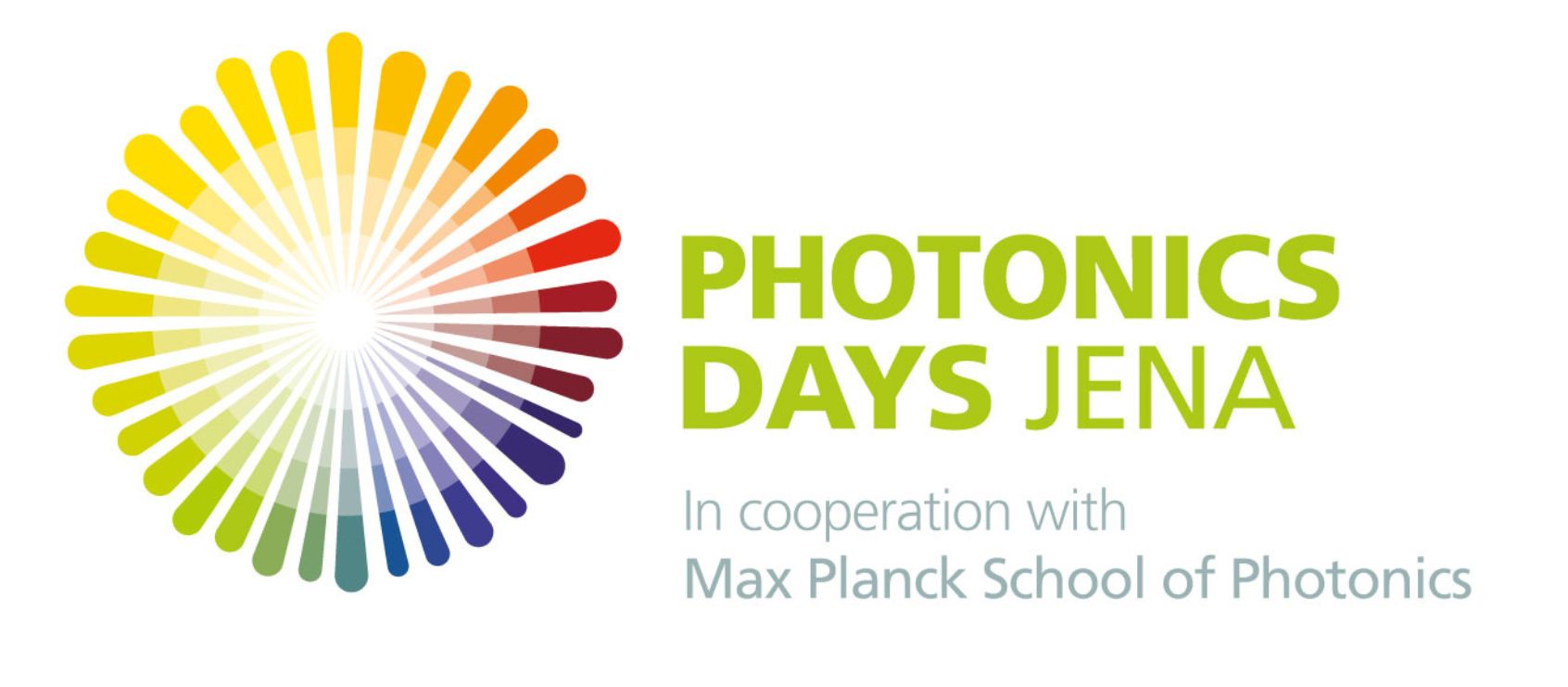 Fraunhofer Institute for Applied Optics and Precision Engineering IOF
Fraunhofer Institute for Applied Optics and Precision Engineering IOF